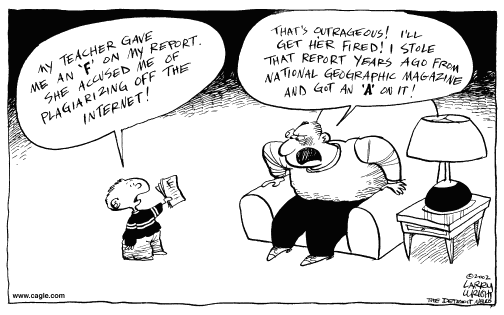Plagiarism: What Would You Do?
This post is part of an ethics-related Progressions series, titled “What Would You Do?”
At one of my first internships I was asked to write weekly blogs. As I researched the topic I chose to discuss, I found several articles online that perfectly articulated the points I was trying to make.
Copying content found online would be plagiarism, but if I reworded phrases or borrowed ideas to fit my needs, would it still be wrong?
According to the Merriam-Webster Online Dictionary and plagiarism.org, plagiarism means:
- to steal and pass off (the ideas or words of another) as one’s own;
- to use (another’s production) without crediting the source;
- to commit literary theft;
- to present as new and original an idea or product derived from an existing source.

My generation has grown numb to stealing music online, and similarly, ideas and the written work of others. Although the act of copying and pasting can be done without physically hurting someone, it is still wrong and can lead to legal consequences. Not only is plagiarism unethical, it’s also a career-threatening offense for journalists and public relations practitioners.
In one of my first journalism classes at the University of North Texas, my professor played the film Shattered Glass—the story of a former New Republic journalist who was caught plagiarizing and fabricating stories. At the time it was easy to dismiss plagiarism as something that would never be a temptation, but situations where the line is blurred can be tricky to navigate without proper education on the matter.
The PRSA PSA-16 explains that when practitioners plagiarize, three professional values from the PRSA Code of Ethics are violated: honesty, expertise ands fairness. Plagiarism is not honest. It can compromise the credibility of your client and threaten free exchange of ideas. Credibility is vital for the success of any public relations practitioner. It’s important to develop ideas individually and to give credit where credit is due.
Tips for avoiding plagiarism:
- Avoid using long quotes.
- Attribute sources with quotes and footnotes where appropriate.
- Make sure your writing presents new and unique ideas.
- Use an online plagiarism checker such as plagium.com.
How can you do your part this semester to combat the use of plagiarism?
Lauren Frock is a senior at The University of North Texas studying strategic communications with an emphasis in public relations and a minor in music. Frock is currently serving her second year as president of UNT PRSSA and is passionate about drinking coffee, writing, reading, traveling and meeting new people. Follow her on Twitter @frockl or visit her website, http://www.laurenfrock.com/.
